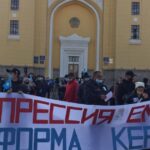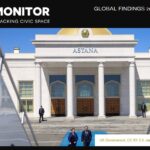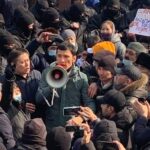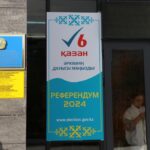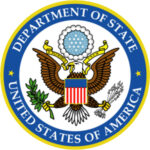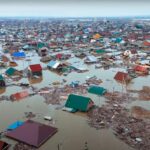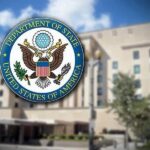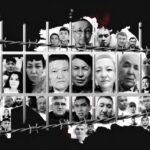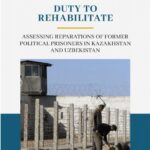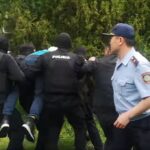Kazakhstan
In the first two years following the introduction of the EU’s Central Asia strategy in 2007 there were a few halting improvements in Kazakhstan’s human rights record, most evidently in the lead up to Kazakhstan’s chairmanship of the Organization for Security and Co-operation in Europe (OSCE), which it held in 2010. Responding to international concerns voiced at the time, the government in 2009 adopted reforms in media and election law. The reforms, however, were incomplete and did not meet the Kazakh government’s promises to implement more meaningful reforms. More strikingly, in the year and an a half since Kazakhstan OSCE chairmanship ended, there have been significant setbacks in Kazakhstan’s human rights record, including the adoption of a new restrictive religion law and the transfer of control of the penitentiary system from the Ministry of Justice to the Ministry of Internal Affairs, putting prisons back in police control.
In December 2011, brief but bloody clashes brought an end to an unresolved seven-month oil workers’ strike in western Kazakhstan. On December 16, police and government troops opened fire on civilians, including striking oil workers, in Zhanaozen, shooting 12 dead following clashes between police and people who had gathered at the central square that day. Three other people died in the clashes and several dozen police officers were wounded, according to official figures. In response, authorities opened a criminal investigation and detained hundreds of people. Authorities later brought criminal charges against 37 people and on June 4, convicted 34 of the 37 defendants, 13 of whom will serve prison time, including several oil workers who provided information to journalists and international organizations during the seven-month strike.
Human Rights Watch documented allegations of ill-treatment and torture by people who witnessed or were subjected to physical abuse by police in custody between December 16 and 19. These individuals described how police variously kicked and beat detainees with truncheons, stripped them naked and walked on them, and subjected them to freezing temperatures. During the trial defendants testified that they had suffered beatings, suffocation, psychological pressure, and other ill-treatment, apparently to coerce testimony against themselves or others. One of those detained, 50-year-old Bazarbai Kenzhebaev, died from a ruptured small intestine and blunt abdominal trauma, injuries he apparently sustained in custody after he was detained on December 16.
There is a glaring lack of accountability for this torture and ill treatment. An Aktau court sentenced Zhenisbek Temirov, the former head of the Zhanaozen temporary detention facility to five years in prison in relation to Kenzhebaev’s death, but no police officers were held accountable for the torture and beatings that led to brought about his death. The allegations of ill-treatment and torture by defendants in the trial of 37 were not investigated in manner capable of bringing the perpetrators to justice, suggesting that the authorities are not taking seriously broader problem of impunity for torture in places of detention in Kazakhstan.
In recent months, the authorities have used a vague and overbroad criminal charge that is incompatible with human rights law against other outspoken oil workers and civil society activists, including a well-known theater director, Bolat Atabaev and unregistered opposition party Alga! leader Vladimir Kozlov. The activists were charged with “inciting social discord,: an offense that is so vague and broad that it can be used to criminalize lawful behavior protected by human rights law, such as freedom of opinion, expression, and association. The charge, which carries a maximum sentence of 12 years in prison, was also used against union lawyer Natalia Sokolova, who in August 2011, was sentenced to 6 years in prison for legitimate union activity (she was later released). The chargeshould be repealed or amended to be compatible with international human rights law.
The government also keeps tight control over freedom of assembly and speech. Peaceful public meetings of a political nature that are not expressly supportive of government policies are likely to be denied a permit. In recent months, dozens of people, including opposition activists who have held rallies in Almaty, have been fined or handed 15-day administrative sentencesfor organizing and participating in unsanctioned protests under restrictive freedom of assembly rules.
The environment for freedom of expression in Kazakhstan is marked by government loyalists dominating broadcast media outlets, harassment of independent journalists, prohibitive penalties for civil defamation, and criminal penalties for libel. On April 19, unidentified assailants attacked Lukpan Akhmedyarov, a journalist with the independent newspaperUralskaya Nedelya,stabbing him eight times and shooting him with a traumatic (non-lethal) weapon.
The EU should urge the government of Kazakhstan to:
· Promptly and impartially investigate all allegations of torture and ill-treatment in connection with the Zhanaozen violence, including the circumstances leading to Bazarbai Kenzhebaev’s death and hold the perpetrators accountable;
· Drop the overbroad and vague criminal charge of ‘inciting social discord’ against political opposition activists Vladimir Kozlov, Aizhangul Amirova, Serik Sapargali, Zhanbolat Mamai, Bolat Atabaev and the six oil workers also under arrest on this charge, and release them from pre-trial detention.
· Repeal or amend to be compatible with international human rights law article 164 of Kazakhstan’s Criminal Code – ‘inciting social discord’ – as it fails to meet the principle of legality or necessity;
· Review the legislation on freedom of peaceful assembly and ensure the laws and regulations on demonstrations are in conformity with Kazakhstan’s international human rights obligations on freedom of assembly;
· Cease detaining and fining individuals for exercising their right to peacefully protest and allow future peaceful protests to proceed without undue police interference;
· Adopt measures to protect the physical safety of journalists, including prompt and thorough investigation into attacks and swift prosecution of those found responsible for acts of violence and intimidation against journalists, including when such perpetrators are public officials.
Kyrgyzstan
In June 2010, inter-ethnic violence rocked southern Kyrgyzstan leaving hundreds killed, thousands injured, and more than 2,600 homes destroyed, and resulted in nearly 100,000 ethnic Uzbeks temporary fleeing to Uzbekistan from the country’s southern provinces. While the situation has stabilized since then and Kyrgyzstan experienced a peaceful transfer of power from interim president Rosa Otunbaeva to current president Almazbek Atambaev in October 2011, the June 2010 violence had disastrous results for human rights in Kyrgyzstan.
Dozens of trials related to the June 2010 violence were seriously flawed byviolationsof the defendants’ rights from the time of detention throughto conviction, and were marked by harassment and physical attacks against lawyers in southern Kyrgyzstan who defended ethnic Uzbek clients.
Hundreds of mostly ethnic Uzbek defendants have been found guilty and sentenced to prison terms ranging from several years to life, based primarily on confessions that many alleged were coerced under torture. Torture and arbitrary detentions in the context of investigations into the June 2010 violence have gone largely unpunished, and harsh verdicts have been upheld by the Kyrgyzstan Supreme Court. Over the last year, Kyrgyzstan has continued to grapple with the consequences of the 2010 inter-ethnic violence, with the justice process skewed to scapegoat ethnic Uzbeks, who to date are targeted without redress for abuses against them. These human rights violations, such as arbitrary detention, torture, and extortion, undermine efforts to promote stability and reconciliation in the south.
While the use of torture to extract confessions continues to be a widespread problem across Kyrgyzstan, authorities have acknowledged torture to be a problem and have recently taken some positive steps to address it. On June 7, the government adopted a law on the National Center for the Prevention of Torture and other Cruel, Inhuman or Degrading Treatment or Punishment, whichfulfills Kyrgyzstan’s obligation under the Optional Protocol to the United Nations Convention against Torture and other Cruel, Inhuman or Degrading Treatment or Punishment to establish a national mechanism to prevent torture in places of detention. The authorities also concluded a Memorandum of Understanding on Human Rights and Fundamental Freedoms, signed by various government agencies, international and domestic human rights groups, which allows the signatories to make unannounced visits to places of detention.
Most human rights defenders in Kyrgyzstan are able to work without fear of harassment by the authorities, however, activists who have exposed violations following the June 2010 violence have faced hostility, particularly among nationalist groups. Kyrgyzstan authorities continue to keep Azimjon Askarov, a prominent human rights defender who has worked on documenting police treatment of detainees, in prison, where he is serving a life sentence, despite a prosecution marred by serious violations of fair trial standards, allegations of torture, violence and threats. Askarov was found guilty of involvement in the gruesome killing of a policeman and injuring several officers during mass disturbances in the southern city of Bazar-Kurgan in June 2010. On December 20, 2011, the Kyrgyzstan Supreme Court upheld the verdict.Despite Askarov’s credible allegations of torture, prosecutorial authorities have refused to open a criminal investigation into the allegations.
Since April 2010, when then-President Kurmanbek Bakiev was ousted from power, Kyrgyzstan has made some improvements on media freedoms, including by decriminalizing libel in July 2011. However, authorities attempted to limit freedom of expression by moving to block the internet news site Ferghana.ru and failing to investigate attacks on journalists in 2011. In addition, the government has not effectively addressed long-standing problems of gender-based violence, including widespread domestic violence in Kyrgyzstan and bride abduction.
The EU should urge the government of Kyrgyzstan to:
· Conduct an independent review with the participation of international legal experts of all proceedings related to the June violence. Reopen proceedings in cases in which the authorities have not properly investigated allegations of torture, or in which there have been serious violations of defendants’ fair trial rights.
· Direct the General Prosecutor’s Office to fulfill its responsibility under Kyrgyz law to investigate, in a thorough, impartial, and timely manner, all torture allegations against law enforcement officials, regardless of rank and whether the victim or family has filed a formal complaint.
· Take action to provide lawyers protection if their security is threatened as a result of their professional activities.
· Rescind undue restrictions on the media, respect freedom of information, and tolerate all forms of legitimate speech, including criticism of the new government and its policies.
· Issue a clear statement at the highest political level that prevention of domestic violence – including bride abduction – is a priority policy issue and to develop a more effective state response to domestic violence and bride kidnapping.
Tajikistan
While the Tajik government has exhibited a willingness to engage with the EU on certain areas of human rights, the overall situation in the country remains poor. In 2011, the government persisted with enforcing a repressive law on religion. Authorities restrict media freedoms and journalists have been targeted for their work. Women and girls in Tajikistan face severe gender-based discrimination and domestic violence; violence in the home impacts women and children alike. In recent months, Tajik authorities have periodically blocked internet access to the country’s leading independent news agency, Asia-Plus, and to social media websites such as Facebook.
Torture remains an enduring problem within Tajikistan’s penitentiary system and is used to extract confessions from detainees, who are often denied access to family and legal counsel in pre-trial custody. Despite discussions with the International Committee of the Red Cross (ICRC) in August 2011, authorities have not granted ICRC access to places of detention.
While torture is practiced with near impunity, authorities took some steps to hold perpetrators accountable in 2011. In an unprecedented ruling in September two law enforcement officers were sentenced to eight years in prison (reduced to six years under amnesty) on charges of “deliberate infliction of bodily harm carelessly resulting in the death of a victim” and “abuse of powers,” after Ismoil Bachajonov, 31, died in police custody in Dushanbe, the capital, in January. A third officer was sentenced to three years in prison on charges of “negligence,” but was released under amnesty.
NGOs and local media also reported on the deaths of Safarali Sangov, 37, who was detained on March 1 on alleged drug-related charges and died in a hospital several days later, and of Bahromiddin Shodiev, 28, who was detained on October 14 and died in a hospital on October 30. Police claim that Sangov and Shodiev each tried to commit suicide at the police station, but their respective families insist that each died after sustaining injuries during beatings while in custody. In early November a Ministry of Internal Affairs spokesperson announced that there would be a “thorough investigation” into Shodiev’s death and that three officers had been dismissed. Following Sangov’s death two policemen were charged with “negligence.”
In July Ilhom Ismanov and 52 other defendants were put on trial in Khujand for alleged membership in the Islamic Movement of Uzbekistan. Amnesty International reported that during a pre-trial detention hearing on November 12, 2010, the judge ignored Ismanov’s testimony that he had been tortured, including with electric shocks and boiling water, and that other defendants have since made similar allegations of torture and ill-treatment in pre-trial detention.
In a positive move, authorities granted an invitation to the UN special rapporteur on torture Juan Mendez to visit the country in May 2012. During his nine-day mission, the special rapporteur met with government officials, civil society members and representatives of international organizations. He gathered first-hand information from victims and their families, and visited places where persons are deprived of their liberty in and around Dushanbe, Khujand, Isfara, Istarafshan and Kurgan-Tube.
Tajik authorities continue to clamp down on media freedoms. Government officials file debilitating defamation suits that seem aimed at muffling media. Journalists in Tajikistan also face physical attacks and politically motivated prosecution. For example, in February 2011, Khikmatullo Saifullozoda, the editor of opposition Islamic Renaissance Party of Tajikistan newspaper Nadjot, was beaten outside his home in Dushanbe by unidentified assailants and was hospitalized. Authorities opened a criminal investigation but no one has been held accountable. InJune 2011, veteran BBC journalist FIRST NAME Usmonov was detained on charges of membership in the banned religious organization Hizb ut-Tahrir, but released on bail after an international outcry. Authorities persisted in prosecuting Usmonov on charges of complicity in the activities of a banned religious extremist organization, and on October 14 he was sentenced to three years in prison, but released under amnesty. At his trial, Usmonov testified that he had been tortured in pre-trial detention. He denied the charges against him, explaining that his contact with the group was part of his work.
During the last several years, Tajik authorities have further tightened restrictions on religious freedoms, and pursuant to newly adopted legislation, the government now extends far reaching controls over religious education and worship. Authorities have also closed unregistered mosques. In August 2011, President Rahmon signed the highly controversial Parental Responsibility Law, stipulating that parents must prevent their children from participating in religious activity, except for state-sanctioned religious education, until they reach 18-years-old.
Under the pretext of combating extremist threats, Tajikistan continues to ban several peaceful minority Muslim and Christian groups. Local media continue to report on prosecutions of alleged members of Hizb ut-Tahrir and the Jamaat Tabligh movement.
The EU should urge the government of Tajikistan to:
· Publicly acknowledge the scope and gravity of the problem of torture in Tajikistan, ensure that prompt, thorough and impartial investigations are carried out into all allegations of torture and ill-treatment, and implement the recommendations of the UN special rapporteur on torture based on his visit to the country earlier this year;
· Rescind undue restrictions on the media, respect freedom of information, and tolerate all forms of legitimate speech, including criticism of the government and its policies;
· Issue a clear statement at the highest political level that prevention of domestic violence is a priority policy issue and develop a more effective state response to domestic violence;
· Amend the restrictive 2009 religion law and other relevant legislation to bring them into conformity with Tajikistan‘s international commitments, including eliminating legal and other restrictions on peaceful religious practice and worship for all denominations.
Turkmenistan
The Turkmen government’s human rights record remains abysmal and the past five years have seen no meaningful improvements in the many areas requiring urgent attention. Legislative changes in the past several years, including amendments to the criminal and administrative codes, have not addressed the government’s fundamental lack of public accountability, and it remains among the most repressive in the world.
Independent civil society activists and journalists cannot work freely in the country.Human rights defenders both in Turkmenistan and in exile facea constant threat of government reprisal and work under extremely dangerous circumstances. The Turkmen government continues some of the worst human rights practices that were hallmarks of the Soviet era – forcibly detaining dissidents in psychiatric facilities and sending into internal exile those who fall out of government favor.
The country remains closed to any independent human rights scrutiny. No independent organization has been permitted to monitor the human rights situation inside the country, and no international agency—governmental or non-governmental — has had access to detention facilities. No fewer than nine UN special procedures remain unable to carry out country visits despite longstanding requests for access due to the government’s refusal to issue the required invitations. A visit in September 2008 by the UN Special Rapporteur on freedom of religion – the first, and only, UN special rapporteur to visit the country – gave rise to hope that it would be followed by a more sustained opening of the country to independent human rights monitoring. Nearly four years later, however, no further visits have materialized. An International Committee of the Red Cross (ICRC) delegation visit to a women’s prison in March, while welcome, should not be confused with the kind of systematic and unfettered access that would permit ICRC to carry out its core mandate.
Unknown numbers of individuals continue to languish in Turkmen prisons on what appear to be politically motivated charges. The justice system lacks transparency, trials are closed in political cases, and the overall level of repression precludes any independent human rights monitoring from taking place. These factors make it impossible to arrive at a reliable number of alleged political prisoners or evaluate the legitimacy of the charges laid against them. A number of well-known political prisoners continue to serve lengthy sentences on trumped-up charges, including Annakurban Amanklychev and Sapardurdy Khajiev, who worked with human rights organizations prior to their imprisonment in 2006, and political dissident Gulgeldy Annaniazov, whose relatives have had no information about him since his imprisonment in 2008. A number of arrests in the past 18 months indicate that the Turkmen authorities’ use of imprisonment as a form of political retaliation continues unabated.
Concerns over political imprisonment are compounded by credible allegations of widespread torture and ill-treatment and of enforced disappearances in custody. People profoundly fear talking about mistreatment they or their relatives have endured at the hands of the authorities out of fear of government retaliation. Human Rights Watch is aware of several cases in which individuals detained in Turkmenistan reported that they had been held incommunicado and subjected to ill-treatment, including torture. To the best of our knowledge, in none of these cases has an effective investigation into these allegations taken place.
Turkmen authorities continue to restrict peoples’ right to travel freely by means of an informal and arbitrary system of travel bans commonly imposed on, but not limited to, civil society activists and relatives of exiled dissidents. Such a ban can be arbitrarily imposed on anyone, including students studying in foreign universities or citizens traveling abroad for business or medical treatment.
There is a complete lack of media freedoms in Turkmenistan. All print and electronic media are state-controlled. It is very difficult for foreign media outlets to cover Turkmenistan because they often cannot access the country. Internet access remains limited and heavily controlled by the state. The country’s only internet service provider is state operated, political opposition websites are blocked and continued attacks on other websites are still in place. The government is known to monitor electronic and telephone communications.
The right to freedom of thought, conscience, and religion is severely restricted in Turkmenistan, where no congregations of unregistered religious groups or communities are allowed. Religious communities have been unable to register for years and those few that have managed to register are being raided and their congregants harassed. The Turkmen government has not taken the steps necessary to implement the recommendationsof the UN Special Rapporteur on freedom of religion, following her visit in 2008.
Expropriation, evictions, and house demolitions have taken place in Ashgabat for more than a decade now and on such a scale that clearly violate the government’s obligation to protect the right to private property, to adequate housing and to appropriate compensation, infringing international human rights obligations. While official statistics are not available, Human Rights Watch estimates that in the past decade the projects have displaced thousands of residents. Property owners who have sought to challenge officials regarding evictions and demolitions have been subjected to threats and intimidation by government authorities. The demolitions make way for construction as part of a massive urban renewal project initiated in the late 1990s with further demolitions are scheduled to continue through 2020 in other areas of Ashgabat.
The EU should urge the government of Turkmenistan to:
· Release all those imprisoned on politically motivated charges, including human rights activists Annakurban Amanklychev and Sapardurdy Khajiev and the dissident Gulgeldy Annaniazov,and stop the practice of using imprisonment, including forced incarceration in psychiatric facilities, as a tool for political retaliation;
· Undertake a nationwide, transparent review of all cases of political imprisonment of the past years in order to establish the real number of political prisoners and ensure that victims of abuse are provided with justice;
· Allow human rights activists, civic groups and journalists to operate freely and without fear of persecution;
· Ensure unfettered access to the country, including to places of detention, for independent human rights monitors, including UN special rapporteurs, ICRC, NGOs and other independent experts who have requested access;
· Thoroughly investigate all allegations of torture and ill-treatment, make public the results of such investigations, bring perpetrators to justice and provide victims with an adequate remedy, including compensation;
· Lift arbitrary travel bans imposed on activists, relatives of opposition members, students and others, and dismantle the system that allows for government interference with residents’ ability to leave and return to Turkmenistan;
· Remove excessive restrictions on the right to freedom of religion, freedom of the media and expression; and
· Halt all evictions, expropriations, and demolitions until they can be carried out in a manner consistent with Turkmen national law and Turkmenistan’s international commitments, and create a mechanism for investigating past cases of unlawful expropriation and demolition and providing adequate compensation to victims.
Uzbekistan
With the exception of the abolition of the death penalty in 2009, the Uzbek government has made no substantial improvements in its human rights record since the introduction of the EU’s Central Asia strategy and has persistently failed to fulfill the human rights criteria formulated by EU foreign ministers in various Foreign Affairs Council (FAC) conclusions, most recently in October 2010.
Torture and ill-treatment are used systematically in places of detention to coerce confessions. Muslims who practice their faith outside state controls are persecuted, with hundreds convicted on religious extremism charges every year, and many others re-tried on spurious prison violation charges to keep them incarcerated years after their original sentences are complete.
While Uzbek authorities recently released human rights defender Alisher Karamatov, well over a dozen human rights activists, independent journalists, and opposition figures remain in prison in Uzbekistan in retaliation for their work or criticism of the government. In recent months, the Uzbek government has widened its crackdown on independent civil society, prosecuting rights activists and independent journalists on trumped-up charges, such as fraud or defamation. The government has arbitrarily detained and harassed those at liberty who have attempted peacefully to exercise their right to freedom of assembly. Last month, for example, human rights activist Gulshan Karaeva was violently attacked and threatened after she publicly refused to become a government informant.
In its increasing crackdown on activists and journalists, Uzbek authorities in March deported two well-known international journalists, the BBC’s Natalia Antelava and Viktoriya Ivleva of Russia’s Novaya Gazeta, when they arrived at Tashkent international airport, attempting to visit the country.
At the end of January, just days before his 13-year prison sentence was set to expire, Muhammad Bekjanov, former editor of the political opposition newspaper Erk, was given an additional five-year sentence for alleged violations of internal prison rules. Bekjanov has been jailed since 1999, along with another jailed journalist, Yusuf Ruzimuradov.
Habeas corpus (judicial review of detention), which the Uzbek government claims is an improvement in its rights record, fails to protect detainees against torture. The legal standard is weak, habeas hearings are closed proceedings and judges approve requests by prosecutors to arrest defendants in nearly every case.
A December 2011 report by Human Rights Watch, “‘No One Left to Witness’: Torture, the Failure of Habeas Corpus, and the Silencing of Lawyers in Uzbekistan,” presents extensive, first-hand evidence of wide-scale torture and ill-treatment in pre-trial custody, including cases in which authorities poured boiling water on an activist, hung detainees by their wrists and ankles, subjected them to rape and sexual humiliation, and asphyxiated them with plastic bags and gas masks.
In January 2009, the Uzbek government formally abolished the independent bar association, forcing all lawyers in the country to re-take the bar examination. As a result, the country’s most outspoken and independent criminal defense lawyers were disbarred. In February of this year, the government-controlled bar association upheld a lower commission’s ruling to disbar one of the country’s leading independent lawyers, Ruhiddin Komilov.
Human rights defenders in prison for no reason other than their legitimate human rights work include: Solijon Abdurakhmanov, Azam Formonov, Nosim Isakov, Gaibullo Jalilov, Rasul Khudainasarov, Ganihon Mamatkhanov, Habibulla Okpulatov, Yuldash Rasulov, Dilmurod Saidov, and Akzam Turgunov. Several are in serious ill-health and at least seven have suffered torture or ill-treatment in prison. Another activist, Jamshid Karimov, was reported to have been released in 2011, but is missing, prompting fears that authorities may have detained him or otherwise restricted his movements.
The government refuses to allow domestic and international organizations to operate in Uzbekistan without interference. In March 2011, Uzbek authorities forced Human Rights Watch to close its Tashkent office by persistently preventing HRW staff from receiving visas and accreditation over many years.
The Uzbek government’s record of cooperation with international bodies, in particular the United Nations, remains very poor. It continues to refuse access to all ten UN special procedures who have requested such access—the special rapporteurs on torture, on the situation of human rights defenders, on freedom of religion, on violence against women, on the independence of judges and lawyers, on extrajudicial, summary or arbitrary executions, on contemporary forms of slavery, on freedom of association and assembly, and the Working Groups on arbitrary detention and on enforced disappearances. The last – and only – time a UN monitor was granted access to visit Uzbekistan was in 2002.
Widespread use of government-sponsored forced labor, including child labor, to collect the annual cotton harvest is a pervasive human rights concern in Uzbekistan. There is no evidence that the government has taken any meaningful steps to implement International Labor Organization (ILO) Conventions on the Elimination of the Worst Forms of Child Labor (Convention No. 182) or on the Minimum Age of Employment (Convention No. 138), which it ratified in March 2008, though the government adopted a National Action Plan in 2008 and introduced legislative amendments in December 2009. The Uzbek government has rebuffed ILO requests to gain access for its independent monitors to visit Uzbekistan to assess the extent of its compliance with the international obligations it has undertaken.
There have been recent reports of a renewed government campaign to carry out the forced sterilization of women based on the monitoring of well-known independent rights activists in various regions of Uzbekistan.
The EU should urge the government of Uzbekistan to:
· Immediately and unconditionally release all wrongfully imprisoned human rights defenders, journalists, members of the political opposition, and other activists held on politically motivated charges;
· End the crackdown on civil society and allow domestic and international human rights organizations to operate without government interference, including by promptly re-registering those that have been liquidated or otherwise forced to cease operating in Uzbekistan, and issuing visas and accreditation for staff of international nongovernmental organizations, including Human Rights Watch;
· Take meaningful measures to end torture and ill-treatment and the accompanying culture of impunity, including by implementing in full the recommendations of the United Nations Special Rapporteur on torture, the Committee Against Torture, and the Human Rights Committee;
· Ensure genuine media freedom, ease harassment of journalists and allow domestic and international media outlets, including those that have been forced to stop operating in Uzbekistan, to register and grant accreditation to foreign journalists;
· Allow unhindered access for independent monitors, including UN monitors that have been unable to visit due to the government’s refusal to issue the required invitations, and implement recommendations by independent monitoring bodies, including UN treaty bodies and special procedures;
· End forced child labor in the cotton sector, allow independent monitoring and involve independent nongovernmental organizations in assessments of child welfare, particularly as they relate to the cotton sector;
· End religious persecution, including by decriminalizing peaceful religious activity and ending the imprisonment of thousands of people for their nonviolent religious expression.
SOURCE:
Human Rights Watch
www.hrw.org/news/2012/06/20/central-asia-overview-key-human-rights-concerns-and-recommendations

